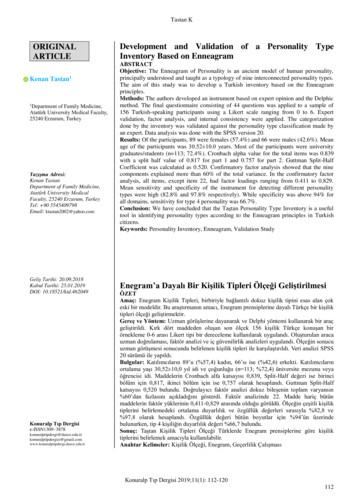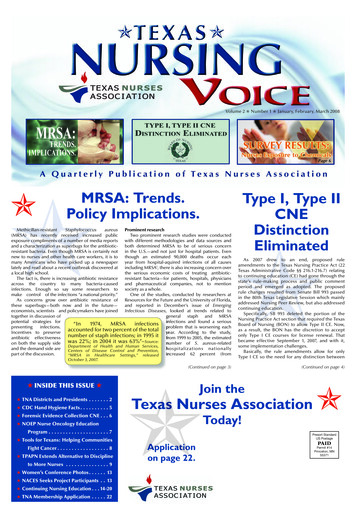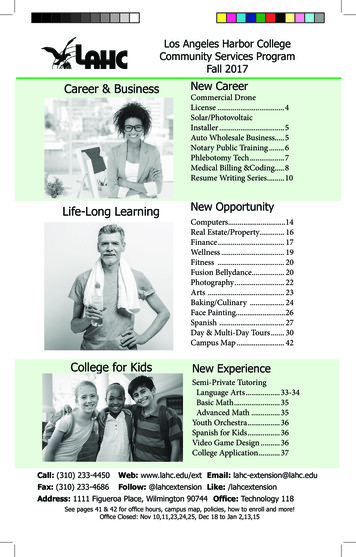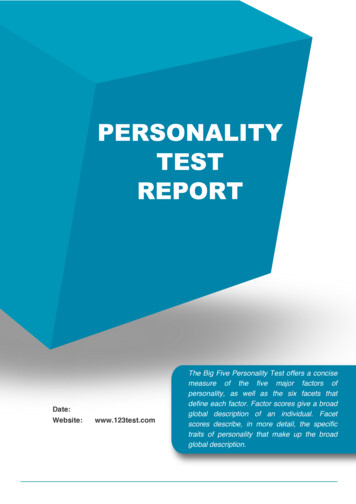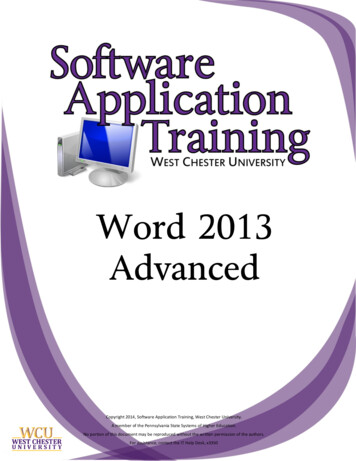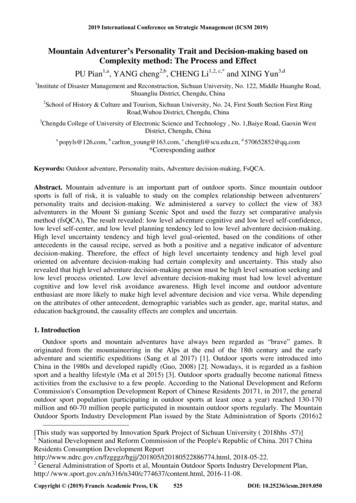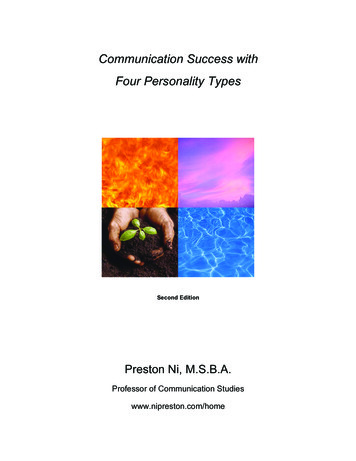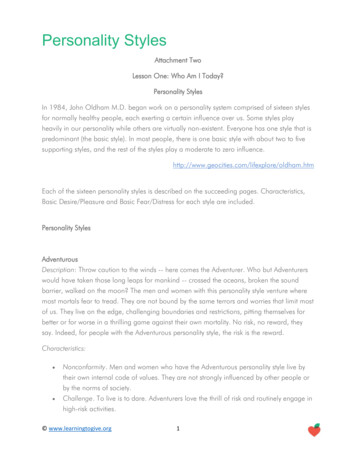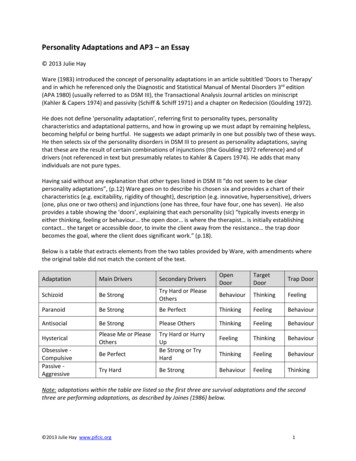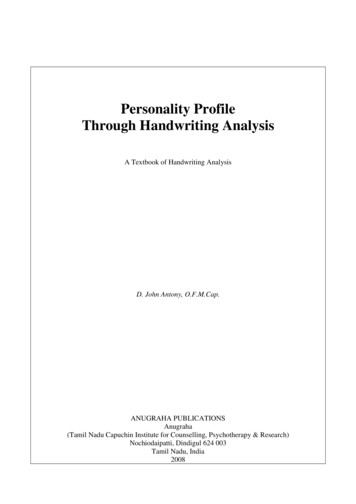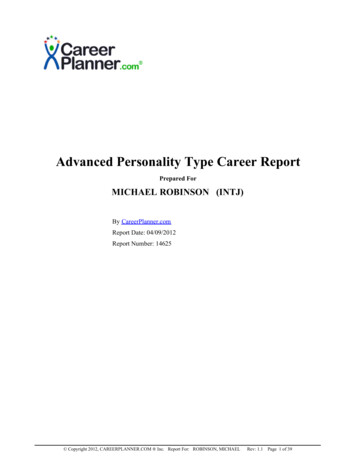
Transcription
Advanced Personality Type Career ReportPrepared ForMICHAEL ROBINSON (INTJ)By CareerPlanner.comReport Date: 04/09/2012Report Number: 14625 Copyright 2012, CAREERPLANNER.COM Inc. Report For: ROBINSON, MICHAELRev: 1.1Page 1 of 39
Table of ContentsIntroductionPersonality TypeBrief Background of Personality Type TestingPersonality Type TheoryDecoding Each of the Four Letters in Your Personality Type - INTJFull Description of Your Personality Type - INTJYour Career DirectionStrengths and Natural Abilities for INTJsAligning Your Career with the Core Values of INTJsFurther Career Alignment with Your Personality TypeList of Best Careers for INTJsList of Worst Careers for INTJsWeaknesses for INTJs and What To Do About ThemMid Life Personality ChangesLife after 40Life after 50Improving RelationshipsUsing Type to Understand Others BetterSpecific Relationship Advice for INTJsChange Your Behavior, Change Your WorldStopping Your Weaknesses from Sabotaging Your CareerFurther ReadingBook Recommendations Copyright 2012, CAREERPLANNER.COM Inc. Report For: ROBINSON, MICHAELRev: 1.1Page 2 of 39
Your Personality Type: INTJPercent of Male Population: 6.5 %;Percent of Female Population: 3.4 %IntroductionThis report explains your Personality Type (INTJ) and shows you how to apply this knowledge of yourtype to your career, your relationships and your life.We recommend that you read this report front to back because the concepts build on themselves. An initialreading of this report typically takes less than 30 minutes. Once you have read the report you can alwayscome back to each section as needed.What's covered:First we describe how Personality Type affects most of what you do and how youbehave.Then we explain each of the 4 letters (I-N-T-J) in your type and what it means to you.To make learning easier and faster, we also show you what the opposite personality typelooks like. This contrast will help you understand your type more quickly.After describing the individual letters in your type, we explain your INTJ personality type in full. In thissection you will begin to see how your type is more than just the sum of the meaning behind each of the 4individual letters.Once you understand your personality type, you are ready to discover just how strongly your typeinfluences your career direction. Here we cover your natural abilities (strengths) and your core valueswhich you will want to align with your career and the type of work you do.We show that career success, satisfaction and fulfillment depends on having good alignment between yournatural abilities and values and the type of work you do.Here we also cover the weaknesses that are common to INTJs, and we explain how those weaknesses couldbe areas where you are unconsciously sabotaging your career.Knowing your strengths and weaknesses is key to marketing yourself well and to landing the right job.At this point we provide you with a list of careers that have been proven to work well for INTJs, and a listof careers you might want to avoid.Before leaving the career direction section we show you what changes to expect as you approach age 40 andthen again after 50. This is based on your type and each type experiences different changes at 40 and 50.Next we cover relationships, because interpersonal relationships are a big part of any career. We show youhow to get along better with others based on their personality type. We also show you what things you maybe doing to damage your relationships. This all comes from knowing your personality type.Finally, we show you how to change your world by changing your behavior, one second at a time.After reading this report you will have seen how powerful "Personality Type" is and how you can use it toachieve a better, more fulfilling and more rewarding career. Copyright 2012, CAREERPLANNER.COM Inc. Report For: ROBINSON, MICHAELRev: 1.1Page 3 of 39
Personality Type Testing BackgroundThe Personality Type system, as used to create this report is based on pioneering work by noted SwissPsychiatrist, Carl Gustav Jung and later work by Isabel Myers and Katherine Briggs.Carl Jung defined the different personality types, thereby laying the groundwork for others.Isabel Myers and Katherine Briggs originally developed testing for the 16 personality types for the purposeof helping place people into jobs where they could be the most satisfied and most productive. Since then itsuse has been expanded to include everything from team building to match making.The personality test you took at CareerPlanner.com is a proprietary test developed and wholly owned byCareerPlanner.com.Personality Type TheoryThere are 16 different personality types within the system and each one is represented by a four letter code,known as a "Personality Type" or a "Type."There are two very important points to remember:1) Each of us has only one "Personality Type."2) Your type stays the same throughout your entire life.You were an INTJ at birth. You are an INTJ now, and when you get older, you will still be an INTJ.This does not mean your personality won't develop and mature. It does mean that you have the samefundamental four letter personality type from birth to death.This concept that you have the same fundamental personality type throughout your entire life is very usefuland very powerful. It makes learning about your type worth the effort. There are very few constants in life.There are very few things that you can count on to remain the same over a 90 to 100 year period, but your 4letter personality type is one of them.However, there is an interesting twist to personality and aging:As you approach age 40 and then again sometime after 50, you will begin to experience other aspects ofyour type and these will give rise to new interests, preferences and natural abilities. Your four letter typewon't change, but you will start to experience different aspects of your type. More on that later.Your Preference ProgramYour personality type at birth can be thought of as small computer program hidden away in your brain. Itinfluences how you "prefer" to get along with people, how you prefer to make decisions, how you prefer tosee and experience the world, and what type of work you prefer to do.This small but powerful program stores your preferences. It's your very own "Preference Program."Don't worry, your preference program does not have total control over you, making you some kind of robot.You can always consciously override the program and choose to behave differently. However, yourpreference program does influence how you act naturally and how you act unconsciously.Your preferences represent a very powerful force in your life, yet normally they go unnoticed. In fact, if youdo not recognize your preferences, they will have much more control over you.Imagine how useful it would be to know what this hidden computer program has in store for you. After all,it will affect your entire life from birth to death.Also quite useful is to know what other peoples' Preference Programs have in store for them. Copyright 2012, CAREERPLANNER.COM Inc. Report For: ROBINSON, MICHAELRev: 1.1Page 4 of 39
That is the beauty of Personality Type. By finding out about your personality type, you will begin tounderstand why you are like you are. You will also begin to understand why other people are like they are. Copyright 2012, CAREERPLANNER.COM Inc. Report For: ROBINSON, MICHAELRev: 1.1Page 5 of 39
Decoding Your Four Letter Personality TypeBelow you will find a basic explanation of the four letter code that makes upyour personality type.Before you read further there is one very critical concept to understand. Yourpersonality type is much more than just the sum of the meaning of each ofthese four letters. If you simply take the meaning of each of the four lettersand list them, that will come close to describing your type, but for a completeunderstanding you need to see the interactions between each letter. More on that later.It's been proven that the best way to learn about one's type is to first study what each of the individual lettersmeans. Then when you read about each of the 16 types, it will make much more sense.Each of the four letters in your personality type are called "preferences." Because there are actually twopossible letters in each position, there are eight preferences in total. The eight preferences are describedbelow.Your Personality Type Is:INTJE or IS or NThe Extraversion - Introversion PreferenceThe Sensing - iNtuiting PreferenceThe first of the four letters in your personality typedescribes how you prefer to focus your attention:The second letter in your personality typedescribes how you prefer to take in and processinformation:Extraverting - Your focus is more on the externalworld, i.e. what is going on around youIntroverting - Your focus is more on the internalworld, i.e. what is going on in your mindYour type is "I"Sensing - You instantly and directly perceive eachof the 5 senses as separate channels of informationiNtuiting - You perceive sensory information afterit has been processed and associated with othermemoriesYour type is "N"T or FJ or PThe Thinking - Feeling PreferenceThe Judging - Perceiving PreferenceThe third letter of your personality type describeshow you prefer to make decisions:The fourth letter in your personality typedescribes how you prefer to orient yourself to theexternal world:Thinking - You prefer to analyze situations usinglogical, objective and impersonal analysisFeeling - You prefer to use your gut feeling, yourpersonal sense of right and wrong, and you placegreat emphasis on how people will be impacted byyour decisionJudging - You constantly judge (make a decisionabout) what you are experiencingPerceiving - You immerse yourself in eachexperience and observe it without judging itYour type is "J"Your type is "T" Copyright 2012, CAREERPLANNER.COM Inc. Report For: ROBINSON, MICHAELRev: 1.1Page 6 of 39
More About Your Type: INTJThe eight preferences E/I, S/N, T/F, and J/P combine to form the 16 unique and distinct personality types.By looking at the individual characteristics of each of your preferences (shown below) you will begin tounderstand your personality type.This personalized report does something that books on personality type can not do. Books on type force youto read about all 16 types which for most people is too much to absorb. In this report we focus on your type,and then for contrast and comparison we explain the type that is opposite to you.This makes understanding your type much faster and easier.One word of caution. It is absolutely imperative that you know your exact Personality Type and that we havethe correct type on file for you. If in reading the next few pages you feel that your type is not INTJ, contactus by email. Support@CareerPlanner.comYou have two options if you are not sure about your type:1) Read descriptions of each type, on our site or in the books we recommend on the last page, until you findthe one type that feels right.2) If you are still confused about your type and want personal help, we offer short, phone based "TypeCoaching Sessions" where we will make sure you have the correct type. Then we will run an additionalreport for you, free of charge.Your Extraversion / Introversion preference is for: IYou: Introversion- IntroversionYour Opposite: ExtraversionMore of a private, shy, reserved personVery sociable and outgoingUsually quiet, does not talk a lotTalks a lotUsually waits for strangers to initiatediscussionsEasily initiates conversations with strangersMeeting new people causes anxiety and isdrainingMeeting new people is exciting and energizingPrefers to work alone or with a few trustedcolleaguesPrefers to work with many peopleKeeps thoughts to one's selfThinks out loudFocuses on thoughts, feelings, and impressionsof the inner, mental worldFocuses on people and things in the outer worldPrefers quiet time for concentration and focusLikes variety, action and multitaskingEnjoys focusing on a single task or projectTruly enjoys interacting with lots of peopleAvoids attentionNeeds an audience, enjoys a lot of attention Copyright 2012, CAREERPLANNER.COM Inc. Report For: ROBINSON, MICHAELRev: 1.1Page 7 of 39
Your Sensing / iNtuiting preference is for: NYou: iNtuiting- iNtuitingYour Opposite: SensingFocuses on possibilities, relationships amongideas, and how things workFocuses on facts and detailsGood memory for concepts, theories and howthings workGood memory for details, facts, numbers,historyFocused on the futureFocused in the presentThinks about possibilities and what could beThinks about things that are realGood at envisioning the futureGood at observing and relating to one's presentsurroundingsSometimes appears spacey, absent minded,mentally somewhere elsePhysically well coordinated with quick reflexesStrong use of the 6th sense - intuitionStrong use of the 5 senses to observe the presentrealityPrefers fiction, fantasy, imaginationPrefers the concrete and tangibleAccomplishing one's goals is a high priorityEnjoying every moment is a high priorityInterested in knowing how complex systemsworkInterested in textures, sounds, sensationsLikes to get things doneLikes to be entertained Copyright 2012, CAREERPLANNER.COM Inc. Report For: ROBINSON, MICHAELRev: 1.1Page 8 of 39
Your Thinking / Feeling Preference is for: T- ThinkingYou: ThinkingYour Opposite: FeelingMay appear cold, unfriendly, unsympatheticFriendly, warm, caring, sympatheticHard to get to knowEasy to get to knowKnown for very clear thinkingKnown as a good person to share one's feelingswithUses impersonal, objective, logical analysis toreach conclusionsUses person-centered, subjective analysis toreach conclusionsMakes decisions using logic, analysis, detailedcomparisonsMakes decisions based on feelings and whattrusted people have saidPrefers work that makes sensePrefers work that has value and meaning Copyright 2012, CAREERPLANNER.COM Inc. Report
09.04.2012 · More About Your Type: INTJ The eight preferences E/I, S/N, T/F, and J/P combine to form the 16 unique and distinct personality types. By looking at the individual characteristics of each of your preferences (shown below) you will begin to understand your personality type.File Size: 436KBPage Count: 39
